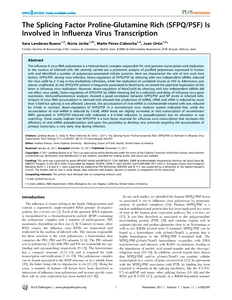Landeras-Bueno, S; Jorba, N; Pérez-Cidoncha, M; Ortín, J
(2011)
The splicing factor proline-glutamine rich (SFPQ/PSF) is involved in influenza virus transcription.
PLoS Pathog, 7 (11).
e1002397 (1)- e1002397 (12).
ISSN 1553-7374
https://doi.org/10.1371/journal.ppat.1002397
SGUL Authors: Perez Cidoncha, Maria Teresa
![[img]](https://openaccess.sgul.ac.uk/107039/1.hassmallThumbnailVersion/ppat.1002397.pdf)  Preview |
|
["document_typename_application/pdf; charset=binary" not defined]
Published Version
Available under License St George's repository terms & conditions.
Download (783kB)
| Preview
|
Abstract
The influenza A virus RNA polymerase is a heterotrimeric complex responsible for viral genome transcription and replication in the nucleus of infected cells. We recently carried out a proteomic analysis of purified polymerase expressed in human cells and identified a number of polymerase-associated cellular proteins. Here we characterise the role of one such host factors, SFPQ/PSF, during virus infection. Down-regulation of SFPQ/PSF by silencing with two independent siRNAs reduced the virus yield by 2-5 log in low-multiplicity infections, while the replication of unrelated viruses as VSV or Adenovirus was almost unaffected. As the SFPQ/PSF protein is frequently associated to NonO/p54, we tested the potential implication of the latter in influenza virus replication. However, down-regulation of NonO/p54 by silencing with two independent siRNAs did not affect virus yields. Down-regulation of SFPQ/PSF by siRNA silencing led to a reduction and delay of influenza virus gene expression. Immunofluorescence analyses showed a good correlation between SFPQ/PSF and NP levels in infected cells. Analysis of virus RNA accumulation in silenced cells showed that production of mRNA, cRNA and vRNA is reduced by more than 5-fold but splicing is not affected. Likewise, the accumulation of viral mRNA in cicloheximide-treated cells was reduced by 3-fold. In contrast, down-regulation of SFPQ/PSF in a recombinant virus replicon system indicated that, while the accumulation of viral mRNA is reduced by 5-fold, vRNA levels are slightly increased. In vitro transcription of recombinant RNPs generated in SFPQ/PSF-silenced cells indicated a 4-5-fold reduction in polyadenylation but no alteration in cap snatching. These results indicate that SFPQ/PSF is a host factor essential for influenza virus transcription that increases the efficiency of viral mRNA polyadenylation and open the possibility to develop new antivirals targeting the accumulation of primary transcripts, a very early step during infection.
| Item Type: |
Article
|
| Additional Information: |
Copyright: 2011 Landeras-Bueno et al. This is an open-access article distributed under the terms of the Creative Commons Attribution License, which permits
unrestricted use, distribution, and reproduction in any medium, provided the original author and source are credited. |
| Keywords: |
Cell Line, Tumor, Down-Regulation, HEK293 Cells, Humans, Influenza A virus, Kinetics, Polyadenylation, RNA Interference, RNA Splicing, RNA, Viral, RNA-Binding Proteins, Ribonucleoproteins, Virus Replication, Virology |
| SGUL Research Institute / Research Centre: |
Academic Structure > Infection and Immunity Research Institute (INII) |
| Journal or Publication Title: |
PLoS Pathog |
| ISSN: |
1553-7374 |
| Related URLs: |
|
| PubMed ID: |
22114566 |
| Web of Science ID: |
22114566 |
| Dates: |
| Date |
Event |
| 2011-11-17 |
Published |
|
 |
Go to PubMed abstract |
| URI: |
https://openaccess.sgul.ac.uk/id/eprint/107039 |
| Publisher's version: |
https://doi.org/10.1371/journal.ppat.1002397 |
Statistics
Item downloaded times since 10 Jul 2014.
Actions (login required)
 |
Edit Item |



